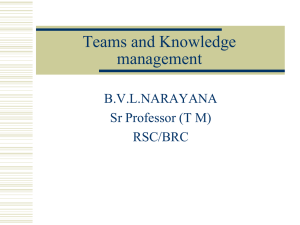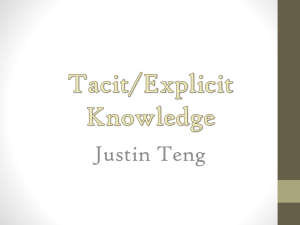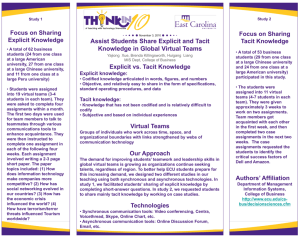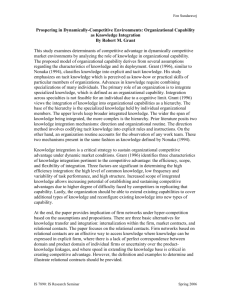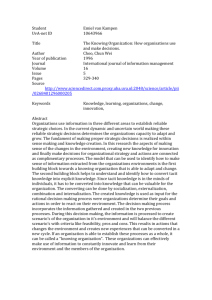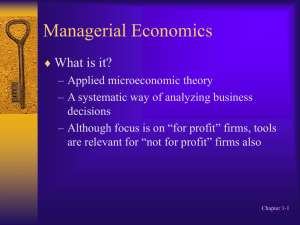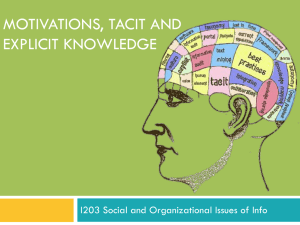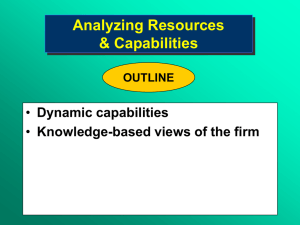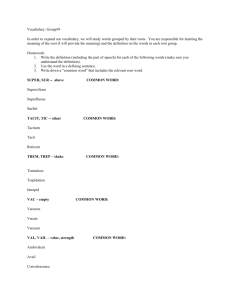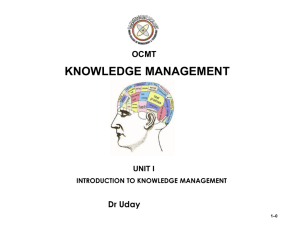Intro to Knowledge management
advertisement
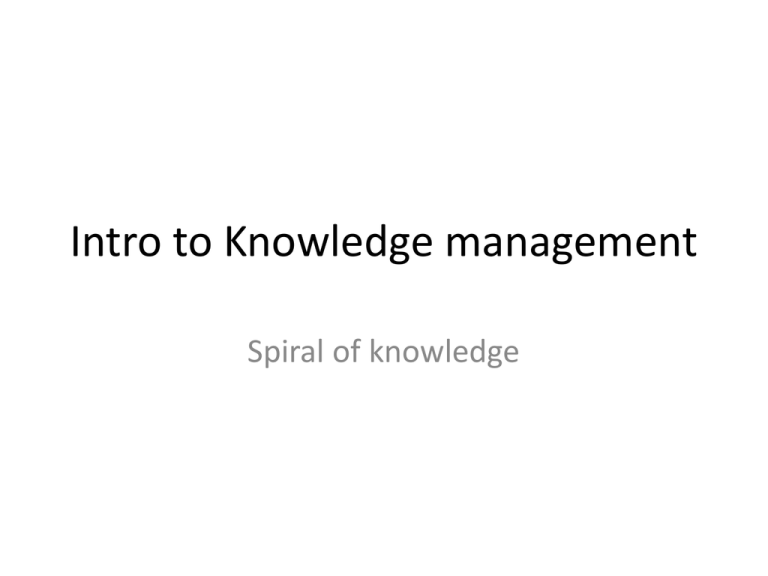
Intro to Knowledge management Spiral of knowledge Explicit vs. implicit Information processing view of organization • Hierarchy – Authority – Information • Division of labor Facet analysis of “knowledge” individual implicit explicit collective Type of knowledge Explicit Conscious Objectified Implicit Automatic Collective Individual Social Locus of knowledge Channels of knowledge sharing Tacit (disinclination to be formalized, externalized) Person to person (bound Communities of practice, to the immediate context social network of its creation) (apprenticeship, participation, ritual, custom) Explicit Impersonal (mediated, transcends time and space; carried by media) Documentation codification (literature, record, computer program) Embodied knowledge (embodied or encapsulated in organization or other artifacts Oral communication (speech, lecture, conversation, question answering, performance) Organizational learning • How organizations translate individual insights and knowledge into collective knowledge and organizational capacity – Skeptics: learning is essentially an individual activity • Yet, sometimes the whole is larger the sums of its parts (synergy) • Both individuals and organizations are learning entities. Cyborg We are borgs; Borg Queen ; https://www.youtube.com/wat ch?v=EYJ9sbM0Hho Spiral of knowledge • “The centerpiece of the Japanese approach is that recognition that creating new knowledge is not simply a matter of “processing objective information”. Rather, it depends on tapping the tacit and often highly subjective insights, intuitions, and hunches of individual employees and making those insights available for testing and use by the company as a whole. ” – The knowledge-creating company (Nonaka Ikujiro, 1991) HBR. Knowledge consultant The spiral of knowledge (Takeuchi & Nonaka, 1995) Synthesize parking, sports Com vs. innovation From tacit to tacit: socialization • Where tacit knowledge can be converted into tacit knowledge through interactions between individuals, whether it is through language, observation, imitation, or practice – synchronizing fireflies Mirror neuron and imitation Socialization (cont.) • Apprenticeship – Learning through observation, imitation and practice (“mirror neuron”) – Shared experience in specific contexts – Emotions and commitment – Not merely transfer of information, but also finding or forming one’s identity in a community Redundancy • The conscious overlapping of company information, business activities, and managerial responsibilities. • Create a common cognitive ground – Internal competition – Proliferation of information – Strategic rotation Externalization • A process of articulating tacit knowledge into explicit concepts. – In the shapes of writings, metaphors, analogies, concepts, hypotheses, or models. From tacit to explicit: articulation • Find a way to express the inexpressible – Conceptualization; theorization • Smile curve; M-shape Society – Story telling • Ichiro Suzuki's bat – Metaphor and model • A way of perceiving or intuitively understanding one thing by imaging another thing symbolically To the left of blue wall Make implicit explicit • 1. Story-telling (parable), metaphor • 2. Codification (skin diagnosis) • 3. Identify novel patterns in data (book buying) Metaphor • from the Greek for "transference," is the use of language that designates one thing to designate another in order to characterize the latter in terms of the former. • a statement that characterizes one thing in terms of another thing, juxtaposing concepts from separate domains of experience. Metaphor can be used to describe abstract or unfamiliar topics, and to express ideas difficult to convey with literal language. – James Geary on Metaphor “Meme”, a metaphor Meme (“Memory” + “gene”) the mind “virus” (Richard Dawkins ) Any idea or behavior that can pass from one person to another by learning or imitation. Examples include thoughts, ideas, theories, gestures, practices, fashions, habits, songs, and dances Metaphor in the creative process • Theory of Automobile Evolution, p. 5 – What image does “evolution” conjure up? – The image of sphere – “Man-maximum, machine-minimum” – Tall boy product concept • Umbrella concept – “Optoelectronics” » The merging of microelectronics with optical technologies • Cannon’s mini-copier – Disposable beer can Vision and corporate culture • At AVIS, We try harder • RR makes the finest car in the world • "Our [Amazon's] vision is to be earth's most customer centric company; to build a place where people can come to find and discover anything they might want to buy online.“ • We devote this university to the spirit of the universe From explicit to tacit: internalization • Reading, studying – Communication (perfect copy) vs. – Innovation (somewhat not so perfect) • Creativity in the interpretation of existing materials • Learning by doing – Driving, swimming, cooking Necker’s cube Vision as a metaphor From implicit to explicit • “Articulation (converting tacit knowledge into explicit knowledge) and internalization (using that explicit knowledge to extend one’s own tacit knowledge base) are the critical steps in this spiral of knowledge. The reason is that both require the active involvement of the self – that is, personal commitment. ” • Teaching and learning not merely transfer of information To the left of blue wall Combination • Systematic knowledge • Discrete pieces of explicit knowledge can be combined into a new whole • Combination knowledge of different originals often a way of innovation – Scientists develop a patch which can inject medicines through the skin without causing any pain. < http://news.bbc.co.uk/go/em/fr//2/hi/health/7002482.stm – http://www.teslamotors.com/ Innovative combinations • “I don’t have to invent anything…It’s out there somewhere if I can just find it and integrate it…Inventing is frustrating, it’s dangerous, it’s expensive, and inventors should avoid it whenever possible. Be a systems integrator. ” Dean Kamen, inventor of the Segway Innovation of printing press Art and computer “I wonder if the Bilbao Guggenheim is a work of architecture at all? Perhaps it belongs to the category of exhibition and fairground displays, of giant inflatables and bouncy castles.” – J G Ballard. the • “I started making shapes that were hard to draw. That led us to the computer and to Catia software which made me realize the possibilities and the level and degree of accuracy you could create in your documents and your relationships because of the software.” Frank Gehry "one of the most remarkable creative statements of the last half-century, in any artistic form. It is also profoundly flawed, a gigantic torso of burstingly noisy music that absolutely refuses to resolve itself under any recognized guise.“ The Penguin Guide to Jazz From explicit to explicit: combination • Synergy : the whole is greater than the sum of its parts – 1+1>2 • Synthesizes information from many different sources – Synthesizing knowledge of persons – Synthesizing codified knowledge (information) – Synthesized data (data mining: make explicit the implicit) • searching for patterns, rules and interesting insights from collected (business) data Dialogue Or collective reflec Building a filed of interaction Systematic Knowledge Learning by doing Networking newly created And existing knowledge
